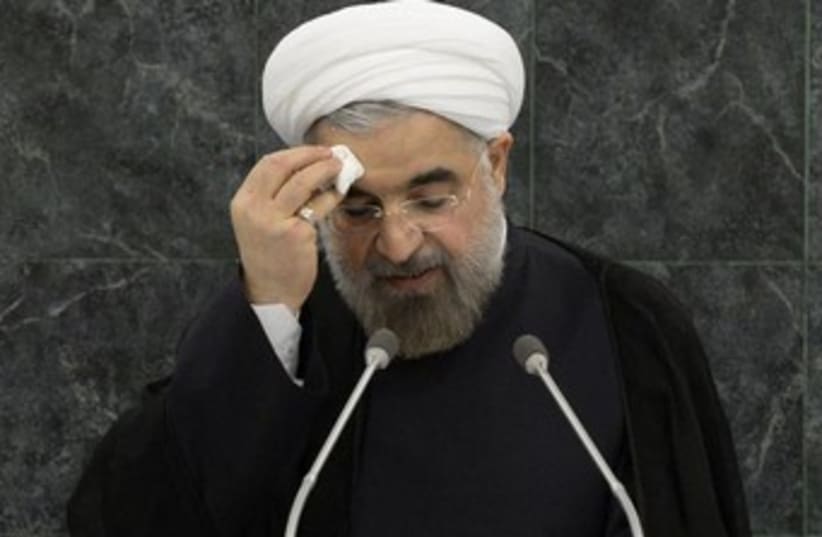As the November 30 Daily Telegraph headline “Israel rages - and no one cares” is typical of an attitude that is blinding the world to the very real danger posed by a nuclear Iran to the entire Western way of life, it is timely to recall a few pertinent FACTS.
Iranian President Hassan Rouhani’s charm offensive has lulled the West into forgetting that the basic reasons for objecting to Iran’s acquisition of nuclear weapons are not the threats against Israel but against all infidels and the entire Western world The real power in Iran lies in Supreme Leader Ali Khamenei, who calls America the devil incarnate and says that negotiating with the US is naive and perverted. On March 14, 2005 he declared on Iran’s Channel 1, “Our people say ‘‘Death to America,’” and the crowd responded, “Death to America, death to England, death to the hypocrites and Saddam. Death to Israel. On May 10, 2013 ,he said: “The European races are barbaric. They wear freshly pressed suits and ties, and they smell of eau de cologne, but deep down, they still have the same barbaric nature known from history. They kill with ease.” (Translation by MEMRI) Rouhani’s charm offensive lulled the P5+1 negotiators into ignoring the most pressing argument for preventing Iran from acquiring nuclear weaponry namely the danger of a nuclear weapon falling into the hands of a terrorist group supported by Iran. Last May a report by the US State Department said Iran’s state sponsorship of terrorism has reached a tempo unseen since the 1990s. Iran was implicated in terror attacks in Asia, Europe, and Africa and certain terrorist groups have expressed interest in using a nuclear device.
A terrorist nuclear explosion could kill hundreds of thousands and destroy the economy of a country.
It was not Israel but the IAEA that alerted the world to Iran’s deceitful nuclear history as confirmed by Rouhani himself when he was Supreme National Security Council Secretary. In a September 2005 speech he said Iran tried to purchase nuclear fuel cycle capabilities as possession of this technology enables enriching uranium to the 90% required for a nuclear weapon.
Israel was not a factor in 2002 when, as Rouhani said, Western media accused Iran of building an atomic bomb and the IAEA approved a resolution against Iran. Rouhani referred to secret tests that the IAEA had uncovered. In one case a university student wrote a dissertation about a project and in another a scholar published a scientific paper about a project. The IAEA acquired copies of both. “Therefore,” said Rouhani “the IAEA was fully informed about most of the cases we thought were unknown to them.”
Rouhani said that in 2003 the IAEA found traces of 70% and 80% enriched uranium causing a new uproar. The IAEA doubted his explanation that that this was due to contamination in centrifuges purchased from a third country.
On August 30, 2012 the BBC reported that UN nuclear inspectors found traces of uranium enriched at 27% at the site, but Iran said those readings could be accidental.
In view of the concerns expressed by Gulf States and some experts and considering that the UN Security Council has adopted six resolutions since 2006 addressing Iran’s nuclear program mostly under chapter VII imposing sanctions and prohibiting enrichment of uranium, it is foolhardy to ignore the real dangers by focusing only on Israel’s objections.
The claim that Iranian enrichment has been halted was directly contradicted by Rouhani and Foreign Minister Zarif who declared that Iran’s enrichment activities will proceed as in the past, that the process of enrichment to 20% will continue based on the plans they had and that the heavy water project at Arak will continue along the same lines as in the current situation.
The declaration that Iran will decide the level of uranium enrichment is in direct conflict with the agreement’s provision that the enrichment level must be mutually defined and agreed upon by both sides in further negotiations The claim that the agreement has frozen essential work on Arak is contradicted by Zarif’s unambiguous declaration that construction work at Arak nuclear facility will continue and Iranian Deputy Foreign Minister Abbas Araqchi said the deal is not legally binding.
Kerry’s interpretation of the Geneva agreement is certainly a welcome positive step and he deserves praise for his efforts and persistence. But it is tragic that the reactions of his Iranian interlocutors confirm Netanyahu’s description of the agreement as a bad deal.
Déjà vu. Sadly the immediate renunciation by the Iranian negotiators of the most essential aspects of the accord are reminiscent of Yasser Arafat’s actions days after signing the Oslo accords as reported in The New York Times of May 25, 1994 “ Last week’s controversy over a recording of his [Arafat’s] call for a jihad, or Muslim holy war, to liberate Jerusalem had barely died down when another explosive excerpt was released from the same speech, secretly taped earlier this month in a Johannesburg mosque. The latest quote cuts directly to the issue of trust by suggesting that the Palestine Liberation Organization’s peace agreement with Israel might soon be broken for a new round of fighting.” And this is exactly what happened.
